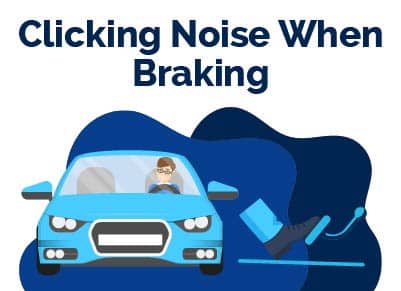Top 6 Causes of Clicking Noise When Braking
February 5, 2024


I am a serial entrepreneur and a consumer advocate. When I’m not helping car buyers, I love working on ventures that have a positive impact.
I run a cause marketing agency and serve on the board of Vayu Global Health where we are disrupting the medical industry and preventing the needless deaths of mothers and babies during childbirth.
Do you ever notice a clicking noise when braking?
If so, something is definitely wrong with your brake system. But what is causing this noise?
The common causes range from rusty anti-rattle springs to bent brake plates.
Our expert editors have curated the top 6 causes of that annoying clicking noise when you hit the brakes and how to fix them.
Key Takeaways
The top reasons for car brakes clicking include:
- Rusty anti-rattle springs
- Worn-out brake shims
- Incorrect brake pads
- Worn calipers
- Worn-out suspension components (ball joints, bar links, struts)
- Bent brake backing plates
Table of Contents
- Key Takeaways
- Clicking Sound When Braking - Troubleshooting Video
- Causes of Clicking Noise When Braking
- How Do You Fix a Clicking Noise When Braking?
- How Much Does It Cost to Fix a Brake Clicking Noise?
- How To Know Your Brake Is Faulty
- Is It Safe To Drive if Your Car Makes a Clicking Noise When Braking?
- What Causes Clicking Noise When Driving?
- Conclusion
- Best Car Deals by Category
- Frequently Asked Questions
Clicking Sound When Braking - Troubleshooting Video
Causes of Clicking Noise When Braking
A clicking sound while braking could indicate that the brake system is not working correctly. The most common causes are:
1. Rusty Anti-Rattle Springs
One of the most common reasons for clicking noises while braking is a rusty anti-rattle spring.
This component prevents the pads from moving and vibrating while you apply the brakes.
Since the anti-rattle springs are made of metal, extreme hot or cold temperatures can weaken them over time.
In addition, the pads might eventually wear out, which could cause premature rotor wear.
When this happens, the pads will start to move and make clicking noises when they're stopped.
2. Worn-Out Brake Shims
Another common cause is the lack of brake shims.
These components play an essential role by insulating the pads from the rotor noise and vibrations.
The thermal barrier helps protect the pads from getting damaged if they get too hot. If the brake pads get weak as time goes on, clicking noises might occur.
3. Installing the Wrong Brake Pads
Improper installation of the pads can also cause brakes to click.
This issue can happen when a mechanic doesn't properly stake down the pads after replacing them.
It will only get louder as you use the brake without repairing it. This could also cause the pads to shift when you apply the brakes.
4. Worn Calipers
If you've been driving a vehicle in wet conditions for a long time, the worn brake pads might rust. This issue could also cause the pads to join.
The guide pins and bolts are designed to keep the brake pads in place. If the guide pins and bolt are loose, clicking noises might occur.
5. Worn-Out Suspension Components
Weight shifting can happen because the suspension is under stress while you're braking.
These are the components that make up the suspension of your vehicle and can make a clicking noise when driving:
Ball Joints
The ball joints connect various joints to enable the car to move. These joints join the steering knuckle with the control arms.
If the ball joints are worn out, they could make the steering wheel less precise. This could also cause various noises and vibrations coming from the steering wheel.
Sway Bar Links
The sway bar helps decrease the body lean when you're taking bends or braking.
The weight shift could also cause the sway bar to click while braking. This happens because the car's weight affects the movement of the sway bar.
The Struts
Struts help reduce the vibrations that the potholes or bumps can cause.
Although it's not common, clicking noises might occur when one of these components begins to develop a fault.
6. The Brake Backing Plates Are Bent
The backing plates for the vehicle's brake system guide the wheels through dirt and damage.
If these plates are bent, they could scratch the rotor or the hydraulic components.
Also, when clicking noises occur, the plates might rub against the rotor or the hydraulic components.
How Do You Fix a Clicking Noise When Braking?
To address the clicking noise, you must determine the cause of the problem. Once you have determined the reason behind your clicking brakes, then you can address it
Essentially, the steps include:
- Evaluate the vehicle to assess the underlying reason for the brakes clicking
- Determine the part(s) that are to blame.
- If it is brake pads, and they are dirty, you can use a metal brush to remove and clean them.
- However, if the part requires replacement, order a new part.
- Remove the old one.
- Replace it with the new one.
- Test the car again to listen for the clicking.
- Bring the car to the mechanic if you do not have experience or tools.
How Much Does It Cost to Fix a Brake Clicking Noise?
Although it's relatively easy to fix a clicking noise, it can be costly depending on the parts:
- Anti-rattle spring: $10 for parts, $30 for labor
- Brake Pads: $10 for parts, $30 for labor
- Replacing Guide Pins and Bolt: $50
- Changing Worn-Out Components of the Suspension System: $150 for a sway bar, $700 for a new strut
Note that cheap brake pads are usually made with inferior components. Therefore, they could become noisy over time. It may be worth spending more on higher-quality parts and a professional mechanic.
While you can change the suspension system parts yourself, we highly recommend letting a professional fix the damage to avoid any errors.
How To Know Your Brake Is Faulty
Various symptoms point to the fact that there's something wrong with your brake system. They include the following:
1. Vibrating Brake Pedal
If your brake pedal is constantly vibrating or pulsating, this could be a sign that you need new brake parts. Having the proper brake components can help prevent accidents.
2. Clicking Sounds
The clicking or the clicking of the brake pads could signify that the pads need replacing.
In addition, the vibrations caused by loose components can damage the brake pads.
Therefore, during the inspection, the mechanic will also look for signs of brake hardware damage.
3. Grinding
A growling or a grinding sound, while you're braking, can signify worn-out brakes.
This could mean that you have no braking material left. The longer you drive in this condition, the more dangerous it will be for you and your passengers.
If you notice this condition, immediately take your car to the mechanic.
4. Squealing
Suppose you hear a high-pitched squeal while braking; it could be time to replace brake pads.
On the other hand, this could be caused by a small metal tab designed to alert you that the pads need service.
5. Deep Grooves in the Rotor
If the brake pads are severely worn down, they could have circular or deep grooves in the rotor.
If these are visible, the pads and the hardware must be replaced. Having a mechanic inspect the entire system to determine the cause of the issue will also help prevent it.
6. Thin Brake Pads
A visual inspection of the brake pads is also an excellent way to check their condition. The pads need replacing if they're less than a quarter of an inch thick.
Is It Safe To Drive if Your Car Makes a Clicking Noise When Braking?
If you can confirm that the clicking noise is coming from the brake pads or the rust-colored anti-rattle spring, it's safe to drive.
However, if the clicking noise is caused by the worn-out components of the suspension system, you must have the issue fixed immediately. Having a damaged suspension could affect your ability to control the car properly.
Overall, it's not wise to drive your car if your brakes are clicking, grinding, or sounding abnormal. Bad brakes pose a serious safety threat, so it's better to have them looked at and fixed by a professional.
What Causes Clicking Noise When Driving?
There are various other reasons your car might be making a clicking or popping noise while driving. Here are some of the reasons why it might be happening:
1. The Hubcaps
The hubcaps are located in the steering system's inner hub. If they become loose, they can constantly move and float. This could be the reason for the clicking or popping noise.
2. The Drive Belt
The drive belt is an essential component of your car as it provides power to various parts of your vehicle, such as the engine, the power steering, and the AC. If the drive belt gets loose, it could cause a popping noise while driving.
3. The Tires
Unevenly inflated tires can cause your car to make a clicking or popping noise while driving. Make sure that your tires are properly inflated.
4. The Brake Calipers
The brake calipers are pins and bolts attached to the car's seat. If they become loose, they can cause a popping sound while driving.
Conclusion
That annoying click you hear when hitting the brakes? It's more than just a sound; it's a heads-up from your car saying something's off with the brake system.
From the sneaky rust on anti-rattle springs to those worn-out brake shims, improperly snug brake pads, or calipers that have seen better days, each plays a part in the symphony of clicks you'd rather not hear.
If your ride's giving you the click-talk, it's time to bring in the pros.
Swing by FindtheBestCarPrice.com for the lowdown on keeping your car in tip-top shape, snag expert advice, and score the sweetest deals on car care.
Best Car Deals by Category
Frequently Asked Questions
Why do my brakes make a noise when I press them?
There are several reasons why car brakes can make noise when you press them including a loose break pad, loose calipers, a bent backing plate, or loose suspension components. Bring the car to a mechanic for assessment.
Why do my brakes click when I change direction?
Loose brake pads can cause a car to click when changing direction, especially if you notice it when braking. Loose brake calipers or bent brake backing plates are another reason.
Why is my car clicking when braking at low speeds?
Problems with the brake pads often cause clicking when braking at low speeds. Improper installation is one potential reason. Take the car to a mechanic for assessment.
Why are my new brakes making a clicking sound?
The most likely reasons for new brakes to click is because the brake pads were installed incorrectly.
Posted in Car Troubleshooting |





